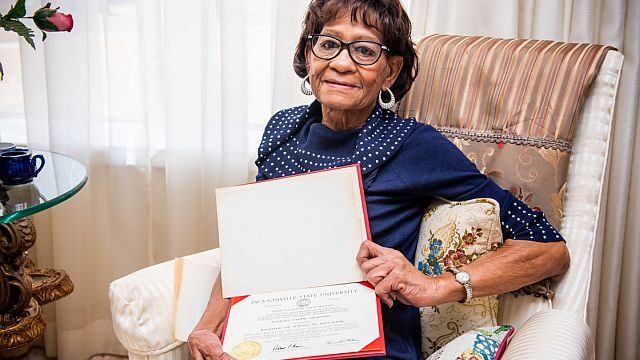
By Donna Cope
Alabama NewsCenter
Adversity can spur one to achieve great things.
At 17, Barbara Curry-Story was stuck between a rock and a hard place. She grew up poor in Ohatchee, in a family that was short on money but long on love.
In the early 1960s in Alabama, simply being a young black woman was an issue. Curry-Story graduated from Calhoun County Training School in Hobson City and dreamed of making her way in the business world.
She went to Alabama Agriculture & Mechanical University for one academic quarter, but money was scarce and the Heart of Dixie was fraught with tension amid the birth pangs of the civil rights movement.
Seeking a job and a better life, Curry-Story went to New York to try to earn money for college. She married and had a son, but the marriage was short-lived.
“The person I married became abusive. He wasn’t who I thought he was,” she said. In 1964, Curry-Story returned to Ohatchee with 2-year-old Joseph.
“My family always supported each other,” Curry-Story said about her parents and five siblings.
Curry-Story was admitted to Jacksonville State University (JSU) and got a work-study job to pay for tuition and help support herself. Since her younger brother lived on campus, he let her take his car to commute.
“I will just say it was the Lord’s will, because had it not been for integration taking place at the time it did, I would not have been able to get an education,” said Curry-Story, 78.
Stay Strong And Carry On
In fall 1965, Curry-Story became the first African American student at JSU, enrolling as an education major in home economics.
“Most people at JSU were very kind to me, some kids were nice – they’d pass by and say, ‘Good morning,’” Curry-Story said.
Despite occasional catcalls, nothing could deter Curry-Story from obtaining her college degree, which would offer money, freedom and a means to provide for her child.
“I wanted to elevate, and I saw this as my only chance because I didn’t have money to go elsewhere,” Curry-Story said. “I couldn’t pay the board and tuition. I’d be going to class and someone would be behind me singing, ‘We will overcome.’ I wouldn’t look back over my shoulder. I didn’t make a rebuttal, but it did bother me.”
A few times, she heard other students say, “She needs to go home.” But Curry-Story endured, and gradually made friends. By the second semester, she studied with them. Still, some situations were difficult. Every time there was a class assembly, one young man would harass Curry-Story. She always sat at one end of the bleachers, and he’d purposely bounce a Confederate flag atop her head.
“He would wave the flag over my head and drag it across my hair, which I put in a bun,” Curry-Story said. “Finally, one day, I told him, ‘Don’t be so ferocious with that state flag.’ I never reported it. People saw it did not faze me because I pretended it was the state flag.
“My intention there was to get an education,” she said. “My entire freshman year, I was the only black student.”
If anyone made an unkind remark, Curry-Story ignored them.
“I totally tuned it out. Sure, I was scared,” she admitted. “Anything could have happened to me.”
Not wanting to create a bigger issue, she refused to complain to administrators.
During her college career, Curry-Story never had a class with another black student.
“I paved the way for people who came behind me at JSU,” she said
Winning A Job At Alabama Power
As graduation neared, Curry-Story began applying for jobs. She was offered a home economics position with a major company in the Midwest. However, her mother pointed out the cost of living would be high.
Curry-Story’s academic dean, Theron Montgomery, asked about her plans after college. Curry-Story explained she wanted to work as a home economist. Montgomery happened to be a college friend of then-Anniston Office Manager Dick Adamson, and recommended Curry-Story for a job at Alabama Power.
A few days later, Adamson showed up at Curry-Story’s house with a job application. Curry-Story applied and was hired in March 1969, as a home service adviser.
“I was floored that they sent me an application. If they hadn’t told me about the job, I’d never have thought about it,” Curry-Story said. “I had no idea Alabama Power had positions like that.”
After graduation, Curry-Story began work on June 2, demonstrating electric appliances at schools. Later, she worked with duct-design layout, electric heat pumps and water heaters. She learned to measure houses to calculate heating and cooling needs.
“I was the first black home economist in Eastern Division,” Curry-Story said. “Up until they hired me, that job was always held for white females. Two years later, they hired two more black employees.
“The company was really kind to me,” Curry-Story said. “I considered Alabama Power Company as my family. I was really pleased when my daughter applied and was selected.”
Curry-Story said she enjoyed a fulfilling career. After 32 years and five months, Curry-Story decided to retire. Her daughter, Starla Curry-Hilliard, applied for the job. At the time, Curry-Hilliard worked in Customer Service in Birmingham.
“I didn’t know she applied for my job and got an interview,” Curry-Story said. “Starla told me, ‘Mom, I wanted to do it on my own and not have you put in any words for me.’”
Barbara had the joy of training Starla.
“To me, it was a great legacy that she replaced me,” Curry-Story said. “She’d been in and out of the power company since she was a tot. It was natural.”
Curry-Hilliard, now a market specialist at Corporate Headquarters, has worked for the company 23 years. Her mother is proud that Starla continued in her footsteps, in the job Curry-Story loved.
“Maybe the legacy will continue, and one of Starla’s boys will be hired,” Curry-Story said, with a smile. “I was really happy with my job and didn’t regret it one bit. I don’t think I could have been happier anywhere else. It becomes like your family – that means a lot, when you’ve got people who work with you and look out for you.”
Curry-Story often tells people she has had a good story in life, despite the early hardships. She was married to her late husband, Henry, for 23 years, and has been married to Roger Story for five years.
“I’ve learned to have a close connection with the Lord, and I’m thankful for everything,” Curry-Story said. “I highly recommend Alabama Power to anyone. If you’re willing to do what you were hired to do, you’ll have a good career.”
This article originally appeared in Alabama Power’s corporate publication, POWERGRAMS.



